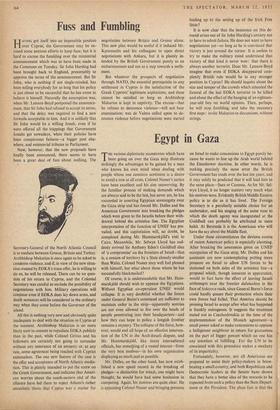Fuss and Fumbling
HAVING got itself into an impossible position over Cyprus, the Government may be ex- cused some anxious efforts to keep face; but it is hard to excuse the fumbling over the ministerial announcement which was to have been made in the Commons on. Tuesday. Sir John Harding had been brought back to England, presumably to approve the terms of the announcement. But Sir John, who is nothing if not single-minded, has been telling everybody for so long that his policy is just about to be successful that he has come to believe it himself. Naturally the assumption was, when Mr. Lennox-Boyd postponed the announce- ment, that Sir John had refused to accept its terms, and that the delay was required to find a new formula acceptable to him. And it is unlikely that Sir John would be a willing Jonah, even if he were offered all the trappings that Government Jonahs get nowadays, when their policies have been conspicuous failures—a bigger post else- where, and ministerial tributes in Parliament.
Now, however, that the new proposals have finally been announced, there seems to have been a great deal of fuss about nothing. The Secretary-General of the North Atlantic Council is to mediate between Greece, Britain and Turkey. Archbishop Makarios is once again to be asked to condemn violence, and if, in view of the new situa- tion created by EOKA's truce offer, he is willing to do so, he will be released. There can be no ques- tion of his return to Cyprus, and the Colonial Secretary was careful to exclude the possibility of negotiations with him. Military operations will continue even if EOKA does lay down arms, and death sentences will be considered in the ordinary way when they come before the Governor of the island.
All this is nothing very new and obviously quite inadequate to deal with the situation in Cyprus at the moment. Archbishop Makarios is no more likely now to consent to repudiate EOKA publicly than in the past, while Colonel Grivas and his followers are certainly not going to surrender without any assurance of an amnesty or, at any rate, some agreement being reached with Cypriot nationalism. The one new feature of the case is the offer and acceptance of North Atlantic media- tion. This is plainly intended to put the screw on the Greek Government, and indicates that Ameri- can worries about the south-eastern end of the alliance have led them to reject Athens's rather unrealistic thesis that Cyprus was a matter for negotiation between Britain and, Greece alone. This new plan would be useful if it induced Mr. Karamanlis and his colleagues to open direct negotiations with Ankara, but it is plainly in- tended by the British Government purely as an embarrassment and not as a step towards a settle- ment.
But whatever the prospects of negotiation through NATO, the essential prerequisite to any settlement in Cyprus is the satisfaction of the Greek Cypriots' legitimate aspirations; and these cannot be satisfied so long as Archbishop Makarios is kept in captivity. The excuse—that he refuses to denounce violence—will not bear examination; was de Valera called upon to de- nounce violence before negotiations were started leading up to the setting up of the Irish Free State?
It is now clear that the insistence on this de- mand arises out of Sir John Harding's anxiety not to have to admit failure. He does not want to have negotiations yet—so long as he is convinced that victory is just around the corner. It is useless to try to make the military mind understand that victory of that kind is never won : that there is always another terrorist. Does Mr. Lennox-Boyd. imagine that even if EOKA disappeared com- pletely Britiih rule would be in any stronger position in Cyprus? He should inquire about the size and temper of the crowds which attended the funeral of the last EOKA terrorist to be killed and about the effect of the hanging of an eighteen- year-old boy on world opinion. Then, perhaps, he will stop fumbling, and take the necessary first steps : invite Makarios to discussions, without strings.


































 Previous page
Previous page